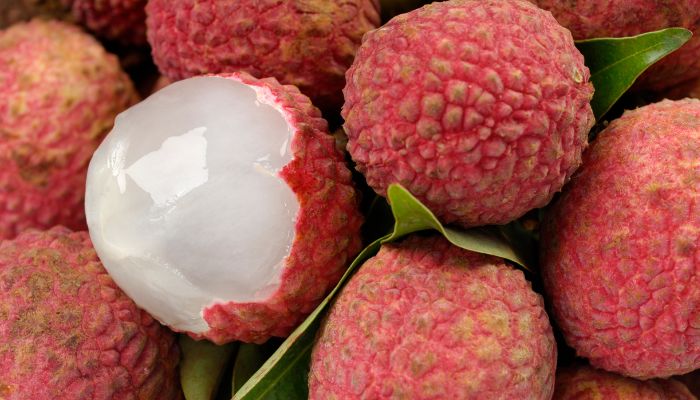
Dogs can technically eat lychee fruit, but it may not be the best idea to feed it to them regularly. The lychee fruit is not toxic to dogs, but it can cause stomach upset and diarrhea if consumed in large amounts. The seeds and skin of the lychee fruit are especially not recommended for dogs as they can cause blockages in the digestive tract if swallowed.
The lychee fruit does have some nutritional value, and it’s high in Vitamin C, which can help boost the immune system of dogs. However, there are many other fruits that are more suitable for dogs to eat and that have similar nutritional benefits.
If your dog does accidentally eat lychee, it’s important to monitor them for signs of stomach upset such as vomiting or diarrhea, and if they persist, you should consult a vet. Also, it’s not a good idea to feed unripe lychee as it can be toxic and cause vomiting or diarrhea.
It’s also good to note that Longan and Mangosteen are also type of fruit that belong to the same family as lychee, they also can cause stomach upset if consumed in large amounts.
It is best to serve lychee to dogs in very small quantities, if at all, and to avoid the seeds and skin. Consult with a veterinarian before making any dietary changes to your dog’s diet.
Table of Contents
Can Dogs Safely Consume Lychee?
There are several opinions on whether or not dogs can safely consume lychee[1]. The general consensus is that lychee is safe for dogs in small quantities, but that the skin and seeds should be removed before feeding it to a dog. Lychee can be poisonous to humans and dogs if eaten before it is ripe, so it is important to only give ripe lychee to your dog. If you suspect that your dog has eaten lychee, look for signs of toxicity such as vomiting and diarrhea. Consult your veterinarian if you have any concerns.
Nutritional Benefits of Lychee for Dogs
Lychee fruit is a good source of several essential vitamins and minerals for dogs such as vitamin C, Vitamin B, potassium, and magnesium. Vitamin C is an antioxidant that can help boost the immune system, while Vitamin B can help with maintaining the health of the nervous system. Potassium is important for maintaining normal heart function, and magnesium can help with maintaining normal muscle and nerve function.
Furthermore, Lychee is also a good source of dietary fiber, which can aid in digestion and maintaining a healthy gut. In addition, lychee also contains small amounts of other nutrients such as copper, manganese, and zinc, which can have additional health benefits. These nutrients can help with maintaining a healthy coat and skin, strong bones, and good overall health.
It’s worth noting that, as with any fruit, it’s important to feed lychee in moderation as a treat and not as a staple diet. It’s always best to consult with a veterinarian before making any significant changes to a dog’s diet, as some dogs may have allergies or specific health needs that need to be taken into consideration.
Risks of Feeding Lychee to Dogs
While lychee fruit may provide certain nutritional benefits, it’s important to be aware of the potential risks associated with feeding it to dogs. One of the main concerns with lychee is the risk of stomach upset. Some dogs may have trouble digesting lychee, which can lead to diarrhea, vomiting, or other stomach-related issues. This is more likely to occur if a dog consumes too much lychee or if the fruit is not properly prepared.
Another potential risk is that of allergic reactions. Some dogs may be allergic to lychee and may experience symptoms such as itching, hives, or difficulty breathing.
It’s also important to be aware that lychee seeds are toxic to dogs, they should never be consumed. Ingesting lychee seeds can cause intestinal blockages, stomach upset and diarrhea.
Additionally, unripe lychee is also toxic to dogs and can cause adverse reactions when consumed, such as vomiting, and diarrhea.
How to Safely Feed Lychee to Dogs
When it comes to feeding lychee to dogs, it’s important to take a few key considerations into account to ensure that the experience is safe and enjoyable for your dog.
First and foremost, it’s essential to consult with a veterinarian before introducing lychee to your dog’s diet, as each dog is different and may have specific health needs or allergies that need to be taken into account.
When it comes to serving size, it’s important to start small, introducing a small piece of lychee at first and gradually increasing the amount over time. As a general rule, lychee should be fed to dogs as a treat, not a staple of their diet.
In terms of preparation, it’s best to remove the seeds and skin from the lychee before giving it to your dog. The seeds are toxic to dogs and can cause intestinal blockages, stomach upset and diarrhea, and the skin can be hard to digest. Additionally, it’s important to avoid giving your dog unripe lychee, as it can cause adverse reactions.
Another key consideration is to monitor your dog closely for any adverse reactions, such as vomiting, diarrhea, or difficulty breathing. If you notice any signs of distress, it’s important to stop feeding your dog lychee and consult with a veterinarian immediately.
Lastly, it’s also important to keep in mind that some dogs may not be interested in eating lychee, and that is okay. It’s important to respect your dog’s likes and dislikes when it comes to food.
Alternatives to Lychee for Dogs
There are several alternatives to lychee for dogs
- Apples: Apples are a great source of fiber and antioxidants, and they can help to regulate blood sugar levels
- Papayas: Papayas are another healthy treat for canines. Like similar fruits, the seeds should not be ingested
- Other exotic fruits: There are several other exotic fruits that are safe for dogs to consume, such as mangoes, coconuts, and pineapples
Summary Can Dogs Eat Lychee?
In conclusion, lychee can be a nutritious and tasty treat for dogs when given in moderation and in the right way. However, it’s important to consider the potential risks associated with feeding lychee to dogs, such as stomach upset, allergic reactions and toxic seeds or unripe fruit. Consultation with a veterinarian is highly recommended before introducing lychee to a dog’s diet.
When it comes to serving lychee to dogs, it’s important to start small, introduce it slowly, remove seeds and skin, and avoid unripe fruit. It’s also essential to monitor your dog closely for any adverse reactions and to stop feeding lychee if any symptoms occur. As with any new food, it’s also important to respect your dog’s likes and dislikes when it comes to food. Lychee should be given as a treat, not a staple of a dog’s diet.





